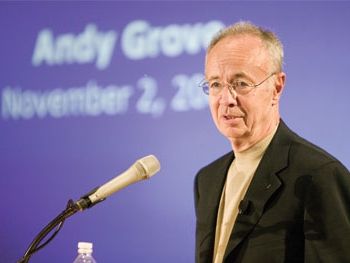
Publisher:
Bonnie King
CONTACT:
Newsroom@Salem-news.com
Advertising:
Adsales@Salem-news.com

~Truth~
~Justice~
~Peace~
TJP
Jan-29-2010 17:48

 TweetFollow @OregonNews
TweetFollow @OregonNews
Revitalizing Community, Revitalizing Our Economy
Juan Carlos Ordóñez OCPP Special to Salem-News.comEchoing the ratification of provisional government at Champoeg, Oregonians' recent votes affirmed the value of community, as expressed through our public structures.
 Andy Grove delivers the eighth annual Thomas J. Fogarty, MD, Lecture before several hundred people. Courtesy: Stanford University |
(SILVERTON, Ore.) - If mythology actually squared with reality, it would not be a lone Oregon Pioneer standing atop Oregon's Capitol. Rather, it would be the group of settlers who voted to create a provisional government at Champoeg in 1843. For while the myth of the self-made individual runs deep in our culture, it's the presence of community that makes individual success possible.
Today, as economic forces batter Oregonians and people across the nation, we must rediscover the value of community, as expressed in our public structures. It is by strengthening our public structures -- our schools, court systems, transportation infrastructure, to name a few -- that we can restore economic opportunity.
There was a time in this nation's history when our public structures were vibrant, a period that coincided with the growth of the middle class and shared prosperity. Perfect it wasn't, certainly not for people of color, but in the period following World War II economic opportunity spread widely.
Consider the case of Andy Grove, former CEO of Intel, Oregon's largest private employer. He immigrated to the U.S. in 1957 and three days after arriving, he enrolled in the City College of New York, which at the time was free of charge. That public institution "gave me a future," Grove noted years later. Such a story is not likely today, certainly not in Oregon. Over the years, we have reduced our support for public colleges and universities on a per-student basis, so that students now shoulder a bigger share of the load. While in 1989-90 students paid 29 percent of the cost, today they pay about 53 percent. It's no surprise, then, that young Oregon adults today are less likely to possess at least an associate's degree than Oregonians approaching retirement.
By no means is the neglect of public structures confined to higher education. Examples are legion. Oregon K-12 schools have among the nation's shortest school years. Our child protective services agency struggles to protect abused and neglected children. We retreated from providing health care to the working poor under the Oregon Health Plan, with the current expansion bringing us to less than half the high point reached over a decade ago. As a share of gross domestic product, annual U.S. state and local public infrastructure and equipment investment is running about half of the rate in the 1960s.
Turning our back on our public structures began in the early 1970s, a move that gathered strength in 1981, when President Ronald Reagan claimed during a tough economic time that "government is the problem." What had been a fairly healthy balance between the private and public sector gave way to the elevation of free-market fundamentalism. Hyper-individualism reigned, and tax cuts to the richest few and to corporations were sold as an economic elixir.
In so doing, we repeated the mistakes of the past. "We have always known that heedless self-interest was bad morals," President Franklin Delano Roosevelt told a depression-weary public. "We now know that it is bad economics."
It's bad not just for individuals but for business as well. A good business climate is in large measure the product of strong public structures -- a skilled workforce training system, a good transportation infrastructure, courthouses open five days a week, for example.
If we are to rekindle economic opportunity, we must -- like that earlier generation of Americans -- abandon heedless self-interest and strengthen our public structures. Oregonians seem ready to take up the challenge, as evidenced by the "yes" vote on Measures 66 and 67.
Echoing the ratification of provisional government at Champoeg, Oregonians' recent votes affirmed the value of community, as expressed through our public structures.
=========================================
Juan Carlos Ordóñez is communications director of the Oregon Center for Public Policy.
Articles for January 28, 2010 | Articles for January 29, 2010 | Articles for January 30, 2010



googlec507860f6901db00.html


Terms of Service | Privacy Policy
All comments and messages are approved by people and self promotional links or unacceptable comments are denied.
Hank Ruark January 29, 2010 6:33 pm (Pacific time)
JCO: From sixty working years split between education and communications --involving some reporting on every one of these basic issues-- I can assure readers that your statement reflects the reality of development during this entire period. Oregon owes OCPP a huge debt for courageous calling it like it really is over its entire life, and setting solid and sensible signals to guide each citizen in those invaluable, unavoidable responsibilities for understandings and then sensitive decisions demanded of us all NOW, as the just- beginning 21st Century offers us opportunity to remake the world anew.
[Return to Top]©2026 Salem-News.com. All opinions expressed in this article are those of the author and do not necessarily reflect those of Salem-News.com.